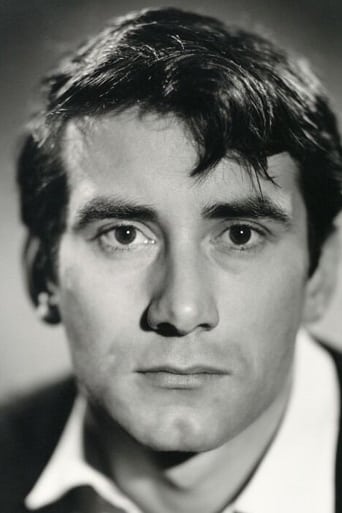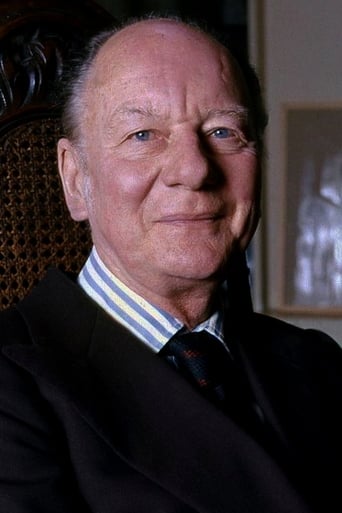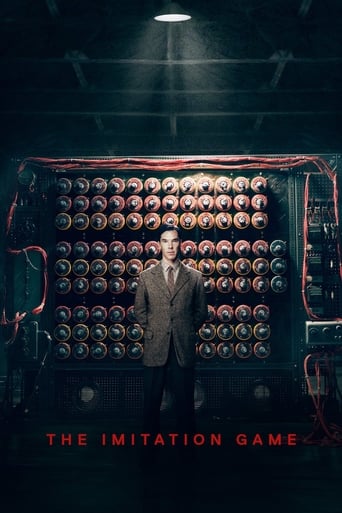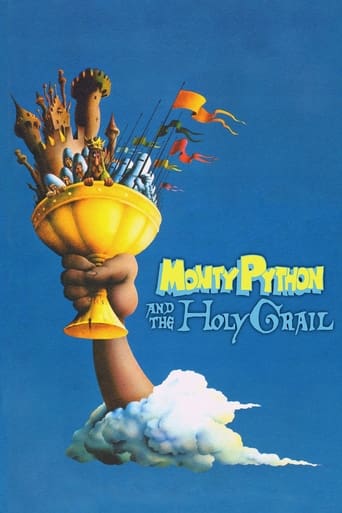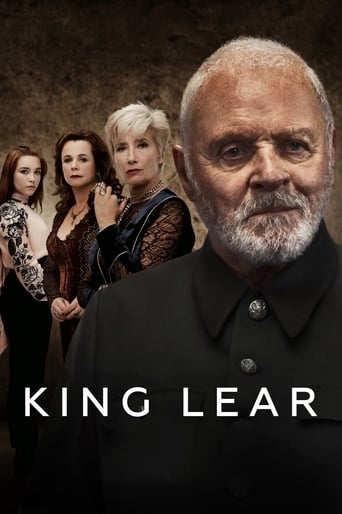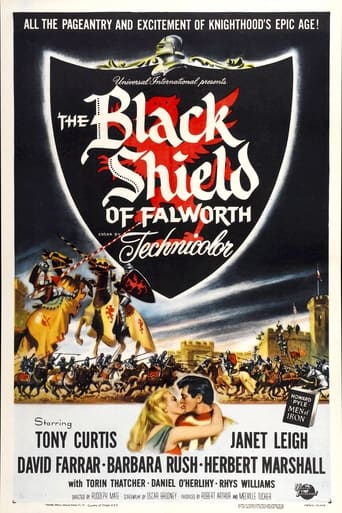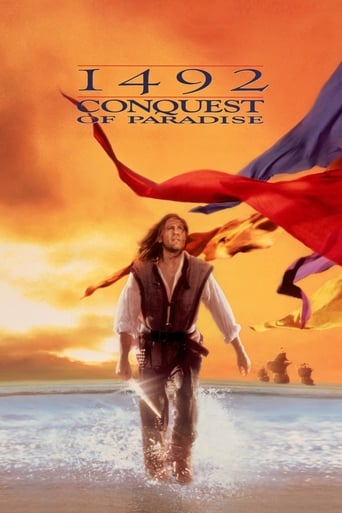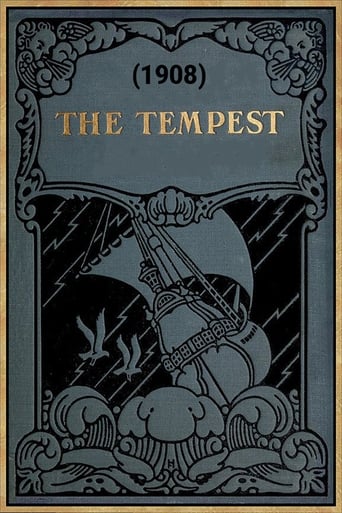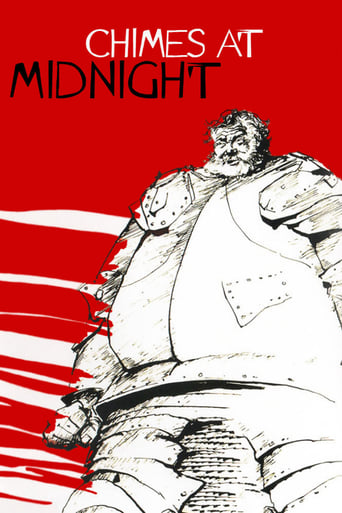
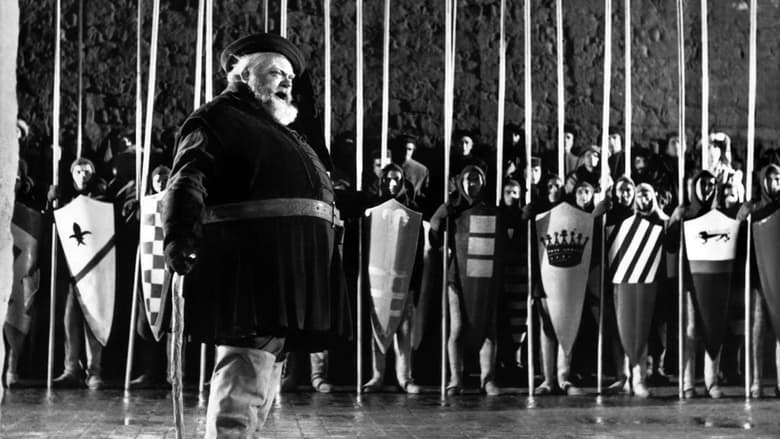
Chimes at Midnight (1965)
Henry IV usurps the English throne, sets in motion the factious War of the Roses and now faces a rebellion led by Northumberland scion Hotspur. Henry's heir, Prince Hal, is a ne'er-do-well carouser who drinks and causes mischief with his low-class friends, especially his rotund father figure, John Falstaff. To redeem his title, Hal may have to choose between allegiance to his real father and loyalty to his friend.
Watch Trailer
Cast
Similar titles
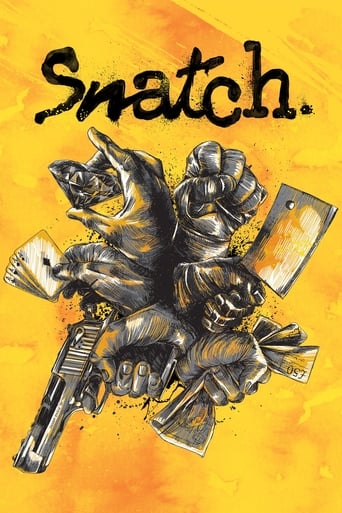
Reviews
Overrated and overhyped
How sad is this?
Like the great film, it's made with a great deal of visible affection both in front of and behind the camera.
The story, direction, characters, and writing/dialogue is akin to taking a tranquilizer shot to the neck, but everything else was so well done.
I won't go into a long review here. Several of you have done admirably in recreating this marvelous presentation. It's Shakespeare but then it is not. Orson Welles did a masterful job of taking a favored comic character, Falstaff, and putting him on the screen as the center of attention, rather than a peripheral supporting character. The language sparkles all the way through. We manage to see his underlying power all the way through. He is a braggart and a bumbler and a real control freak. If you ever doubted that Orson Welles was one of our most magnificent actors, take a look at this. It is he who controls every scene while deadly battles and significant in-fighting occurs in the post Richard III era. I had never heard of this film. Excellent.
It's not exactly daring to declare Citizen Kane to be Orson Welles's most groundbreaking and influential movie. That does not, however, mean that Kane is necessarily Welles's most entertaining and satisfying film. I have long held the latter to be Touch of Evil, but now that I have seen the long unavailable Chimes at Midnight, I might have to reconsider. Welles is indisputably the primary creative force behind Kane and Touch. With Chimes he had some pretty decent source material with which to start. The script is composed of scenes from Shakespeare's Merry Wives of Windsor, Henry IV Parts 1 & 2, and Henry V reconfigured to make Falstaff, Shakespeare's most famous supporting character, into the primary figure of the narrative. But this creates an entirely original story with entirely different themes and politics than those of the original works. This is one of the most contemporary feeling Shakespeare films ever made, even though it in no way departs from the plays' medieval settings. Indeed, the magnificent art direction subtly but powerfully conveys a world of spectacular barbarity where even the most sympathetic characters wander an earth littered with tortured, mutilated, broken bodies displaying not a trace of emotion. There is so much understandable attention paid to Welles the director that we sometimes overlook what a truly gifted actor the man was. And in that regard, this is his masterpiece, the performance of his life . His Falstaff is a soulful hedonist whose gift for gab can make most anyone forgive his rather parasitic nature. This is not the likable, but sometimes violent criminal the character is sometimes imagined to be, but a man who wants his stories to amuse and make one forget or overlook the characters intense vulnerability, and indeed cowardice. Welles always conveys vulnerability, even in his least sympathetic characters, but this is a spectacularly moving performance in which the old Welles uses his physical awkwardness, his jarring girth, to manifest a man who tries to entertain a world he cannot change, or even nimbly navigate. Falstaff is a moving character as written in Shakespeare's three plays that feature Henry V. Yet those plays are ultimately, necessarily, celebrations of feudal power and conquest. The young Henry enjoys the rapscalrony of Falstaff's company, but when the time comes to assume power, he dutifully puts aside childish things and starts a war of conquest for the glory of the nation, which is to say the Crown. Falstaff is, in these plays, that which must be repudiated for the sake of glory. Nothing in this twentieth century work makes feudal power seem glorious. When Henry turns his back on Falstaff it seems the victory of conformity over comradery, of obligation over empathy. It goes without saying that the film is visually sumptuous, characterized by the brilliant deep-focus and chiaroscuro lighting that are Welles's visual hall mark. But one scene stands out as one of the aesthetically greatest of his career as a director. Falstaff, ostensibly a knight, is fitted with a ludicrous, almost tank sized suit of armor to try to contain his rotund form. This machine of awkwardness is plunged into a brutal battle, equipped only for impotence. The image almost had to have been inspired by Max Ernst's near identical 1921 painting, The Elephant Celebes. But where as Ernst's round robot is terrifying, Welles's knight is the clown prince of all that is human.
Locarno 2005 ran a complete Orson Welles retrospective including all of his masterpieces and some lesser known works that are less than masterpieces. The Orson Welles highlight of day seven was his very rarely shown "Falstaff --Chimes at Midnight", 1965, which Welles always claimed as his personal favorite. Loosely adapted from several Shakespeare plays in which the boisterous character of John Falstaff appears. Welles himself plays the ribald central character at a very portly age of fifty and is ably supported by a mainly English cast, notably John Gielgud as the king. French nouvelle Vague actresses Marina Vlady and Jeanne Moreau have cameos. Moreau, it is said, worked for almost nothing just to be directed by a living legend like Welles. The film was shot in Spain and was an international co-production with such complicated distribution rights that they remain unsettled to this day making the film well nigh unseeable under normal conditions. I found it almost unwatchable because Welles is so hammy in it, and it looks like it was just slapped together from whim to whim -- very self indulgent and just plain boring from where I sat. It was an effort to sit it out, which I did as a kind of "critique oblige" type duty. Nevertheless one must offer Kudos to the Munich film archive for getting the unadulterated "Chimes" to Locarno. One of Orson Welles daughters, Chris Welles, is also here to take in the retrospective and said that she is learning things about her own father she never knew before. One thing I never knew is that, in addition to his numerous undeniable masterpieces he made some hammy throwaway junk which, like this film, is nevertheless highly acclaimed by many critics because it would be heresy to find any fault in the works of a certified genius like Welles. Can't complain because it filled in a gap in the filmography of a director whose work I basically venerate just like everyone else, but this one didn't ring any resounding chimes in my personal belfry. Alex, Locarno, August 12. 2005
This is one great and also quite unique Shakespeare adaptation.One of the foremost things that makes this movie unique is the fact that it's not simply based on one William Shakespeare play but instead is a compilation and free interpretation of 5 different ones. So even those who already are very familiar with Shakespeare, will still find plenty of surprises in this movie and get plenty out of it as well.Another thing that makes this movie special, is that it's a very lively production. You can say all you want but most older movies based on Shakespeare plays are incredibly dry and static ones. Almost like you are watching a stage-play, if you will. Not this movie however. It's surprisingly fast paced and with its 113 minutes, it's also 'pleasantly short'.It also has a good and pleasant story in it, that definitely feels and sounds truly Shakespeare. It has all of the typical ingredients and also characters in it, which is no surprise of course, since this movie is being a compiled version of 5 of his different plays.It's all being very well told and directed, by Orson Welles himself, who also plays the main lead. I don't know what is better, Welles his acting or his directing of this movie. It's really pleasantly told and paced all, with often humor but also always a sense for drama and tension in it. His acting is sublime as well but man, did Welles look huge and bloated in this movie. Quite amazing the psychical transformation he went through, throughout the years.But of course Welles is not just the only great actor in this movie. Shakespeare actor John Gielgud also plays a very good role, as Henry IV and I also quite liked Margaret Rutherford, who is perhaps better known as the first and original movie Miss Marple. It's also a pretty good looking movie. It's black & white, like basically every classic Shakespeare movie adaptation and it uses some good looking settings and sets. It most certainly did not look like a cheap production, while the movie still apparently only cost $800,000 to make.Really not much bad to say about this movie. Definitely a must-see, if you are into these sort of movies or Shakespeare. 9/10 http://bobafett1138.blogspot.com/

